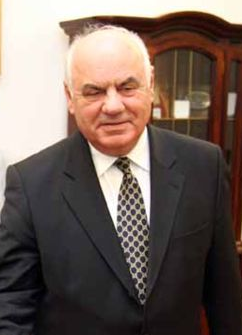
Alfred Spiro Moisiu is a former Albanian military general,diplomat and politician. He was the president of Albania from 2002 to 2007. He is the oldest son of Albanian Army general Spiro Moisiu.

Sali Ram Berisha is an Albanian cardiologist and conservative politician who served as the president of Albania from 1992 to 1997 and 32nd prime minister from 2005 to 2013. Berisha serves as Chairman of the Democratic Party of Albania since 2022 and has held the position previously from 1990 to 2013. He also serves as the incumbent Leader of Opposition in the Albanian parliament.
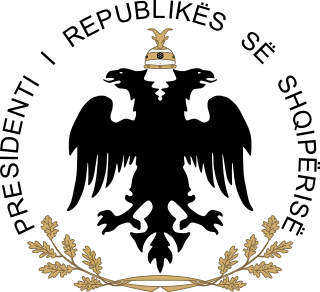
The president of Albania,officially styled the President of the Republic of Albania,is the head of state,commander-in-chief of the military and the representative of the unity of the Albanian people.

The Democratic Party of Albania is a conservative political party in Albania. It has been the largest opposition party in the country since 2013.

Ilir Rexhep Meta is an Albanian politician. He served as the president of Albania from 24 July 2017 to 24 July 2022.

Lesbian,gay,bisexual,and transgender (LGBT) people in Albania face legal challenges not experienced by non-LGBT residents,although LGBT people are protected under comprehensive anti-discrimination legislation. Both male and female same-gender sexual activities have been legal in Albania since 1995,but households headed by same-sex couples are not eligible for the same legal protections available to opposite-gender couples,with same-sex unions not being recognized in the country in any form.

Bamir Myrteza Topi is an Albanian diplomat and politician. He also was the president of Albania from July 2007 to July 2012.
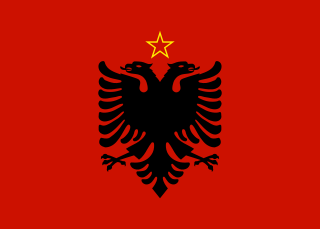
The People's Socialist Republic of Albania,officially the People's Republic of Albania from 1946 until 1976,and from 1991 to 1992 as the Republic of Albania,was the one-party communist state in Albania from 1946 to 1991. It succeeded the Democratic Government of Albania (1944–1946).
In 1991,the Socialist Party of Albania,with specific social democratic ideology took control of the country through democratic elections. One year later the Democratic Party of Albania won the new elections. After 1990,Albania has been seeking a closer relationship with the West. What followed were deliberate programs of economic and democratic reform,but the implementation of capitalism led to the proliferation of pyramid schemes. Chaos in late 1996 to early 1997,as a result of the collapse of these pyramid schemes,alarmed the world and prompted the influx of international peacekeeping forces. In 1995,Albania was accepted into the Council of Europe and requested membership in NATO and is a potential candidate country for accession to the European Union. The workforce of Albania has continued to emigrate to Western countries,especially Greece and Italy.

Manush Myftiu was an Albanian politician during the country's socialist period. He served in a number of positions,most recently as the deputy prime minister.

The Democratic Government of Albania also known as the Hoxha I Government was established on 20 October 1944 by the National Liberation Movement,as the Albanian partisan resistance of 1940–1944 came to a close. A provisional government took power after the liberation of the country from German forces on 28 November. Its interim Prime Minister was Secretary-General Enver Hoxha of the Communist Party of Albania. The interim government was to be in existence until the holding of elections and the convening of a Constituent Assembly.
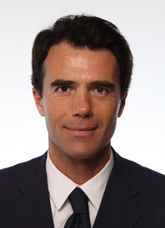
Sandro Gozi is an Italian politician,former Undersecretary of State for European Affairs in the Matteo Renzi and Paolo Gentiloni governments.

Flamur Noka is an Albanian politician,currently serving as the General Secretary of the Democratic Party of Albania. Born and raised in Kukës,in Albania's northern border with Kosovo,Noka joined the Democratic Party in the early 2000s,and quickly started climbing the ranks. From 2012 to 2013,he was Albania's Minister of the Interior.

Gent Hysen Strazimiri was a member of the Assembly of the Republic of Albania for the Democratic Party of Albania (DP). He was Deputy Minister of Interior Affairs from 2007 to 2009. Strazimiri is also member of the committee on Legal Affairs,Public Administration and Human Rights and Committee on Education and Public Information.
Sherefedin Shehu is a member of the Assembly of the Republic of Albania for the Democratic Party of Albania.
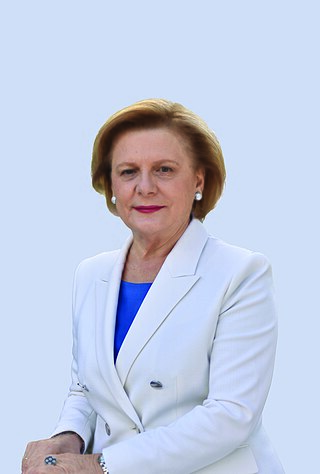
Valentina Leskaj is an Albanian politician and political economist who was a member of the Assembly of the Republic of Albania for the Socialist Party from 2002 until 2017,when she decided to resign and leave politics.
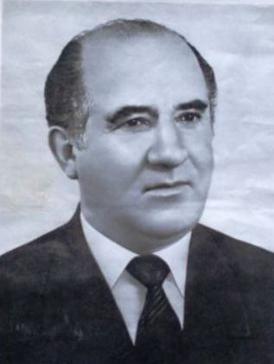
Hekuran Isai was an Albanian politician of the Albanian Party of Labour (PPSh).

Kadri Hazbiu was an Albanian politician of the Albanian Party of Labour (PPSh).

Feçor Shehu was a politician of Communist Albania who served as Minister of Internal Affairs and Sigurimi from 1978 to 1982.

Squatting in Albania began on a large scale in the 1990s after the fall of communism,with internal migration towards formerly collectivised farmland establishing informal settlements. One such area,Bathore on the periphery of the capital Tirana,had 40,000 squatters by the early 2000s who successfully campaigned for better amenities. Other squatters occupied severely polluted post-industrial sites. The Agency of Legalization,Upgrading,and Integration of Informal Zones and Buildings (ALUIZNI) had legalized 16,500 homes on 152 settlements by 2009. As of 2020,25 per cent of the population of Albania's cities lived in informal settlements.

















